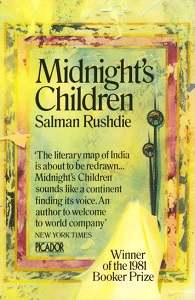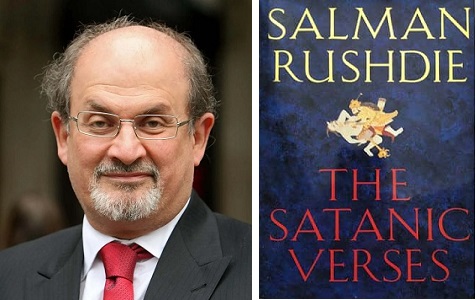Feb 15, 2026
Feb 15, 2026
Way back in 1991, in his address to Columbia University, Sir Salman Rushdie, Indian -born Booker prize-winning surrealist, and post-modern novelist, being perhaps increasingly tired of protecting himself by hiding behind the police cordons and even adopting an alias and wondering if he were reduced to an abstraction, vented out his frustration thus: “For many people I’ve ceased to be a human being. I have become an issue, a bother, ‘an affair’”.
 To better appreciate this anguish of Rushdie, we need to hark back to his phenomenal entry onto the literary scene of the post-modern world. It was in 1981 that Rushdie emerged in the literary world with his second novel, Midnight’s Children, as the signpost of the postcolonial Indian English fiction that depicted a glorious, rip-roarious modern India’s new generation and its policies. It has in the process, having upturned the ‘soft image’ of India—spiritual, and the traditionally struggling semi-urban/rural India—that our early English writers like R K Narayan, Raja Rao, and Mulk Raj Anand had hitherto articulated in a language that is more of Victorian/Edwardian style, truly become the ‘trend-setter’ of fictional writing in India.
To better appreciate this anguish of Rushdie, we need to hark back to his phenomenal entry onto the literary scene of the post-modern world. It was in 1981 that Rushdie emerged in the literary world with his second novel, Midnight’s Children, as the signpost of the postcolonial Indian English fiction that depicted a glorious, rip-roarious modern India’s new generation and its policies. It has in the process, having upturned the ‘soft image’ of India—spiritual, and the traditionally struggling semi-urban/rural India—that our early English writers like R K Narayan, Raja Rao, and Mulk Raj Anand had hitherto articulated in a language that is more of Victorian/Edwardian style, truly become the ‘trend-setter’ of fictional writing in India.
He and his novel had indeed redrawn the literary map of India, paving the way for exciting themes, mesmeric techniques, and amazing creativity in manipulation of the language. The novel, besides winning the Man Booker Prize for the year 1981 and the Booker of Bookers award in 2008 for the best Booker novel in 40 years, influenced and enabled three more Indians to win the Man Booker—Arundhati Roy for The God of Small Things in 1997, Kiran Desai for The Inheritance of Lossin 2006 and Aravind Adiga for The White Tiger in 2008—making the literary world look at India with awe.
It was in 1988 that his fourth novel, The Satanic Verses was launched, which “depicted a character modelled on the Prophet Muhammad and portray him and his transcription of the Quran in such manner” that it sparked intense outrage among some Muslims who considered its content blasphemous. As a sequel to these agitations, some countries, including India, banned the book and yet it remained as a subject of continuing controversy.

On February 14, 1989, the spiritual leader of revolutionary Iran, Ayatollah Ruhollah Khomeini, condemning the book, issued a fatwa against Rushdie. A bounty was also offered to anyone who would execute him. This forced him to hide behind the protection of Scotland Yard, except to once in a while make a surprise presence on public platforms.
Later, Rushdie issued an apology: “I recognize that Muslims in many parts of the world are genuinely distressed by the publication of my novel. I profoundly regret the distress the publication has occasioned to the sincere followers of Islam. Living as we do in a world of many faiths, this experience has served to remind us that we must all be conscious of the sensibilities of others.”
It’s unfortunate that even after over three decades of all this, Rushdie continues to be “an issue, a bother” for the world, for how else can we explain his struggling for breath lying in a hospital bed aided by a ventilator to win over the horrific stabbing by a 24-year-old bigot with a knife at Chautauqua Institution in western New York state where he went to address the gathering on a topic that is dearer to his heart: the US “as an asylum for writers and other artists in exile and as a home for freedom of creative expression.”
Reacting to the sad episode, Booker-prize winning author, Ian McEwan called the stabbing an “appalling attack”, which according to him, “represents an assault on freedom of thought and speech.” True to his observation—“Salman has been an inspirational defender of persecuted writers and journalists…”— Rushdie never missed an opportunity to speak out for upholding freedom of expression. He once said: “Free speech is the whole thing, the whole ball game. Free speech is life itself.”
Here it is pertinent to note what his alleged attacker, Hadi Matar said in an interview: “I don’t like the person. I don’t think he’s a very good person. He’s someone who attacked Islam. He attacked their beliefs, the belief systems.” This whole episode, besides vindicating what one of his characters of Midnight Children uttered: “What you were is forever what you are”, also warns authors to be “conscious of the sensibilities of” people following different faiths.
That said, we must also realize that literature, as an author once said, is, after all, nothing but hypothetical and imaginary, which finds expression in words, and words are certainly not deeds, and as the UN Secretary-General said, “in no case is violence a response to words spoken or written by others in their exercise of the freedom of opinion and expression”.
Secondly and importantly, let us remind ourselves that the most rudimentary norm of any religion is: respect for life—the life of fellow human beings. Unfortunately, this simple dictum of religion gets obliterated by fanaticism. And, fighting against it is perhaps, an eternal challenge for mankind.
Humanity, indeed, commends forgiveness
May God bless him with swift recovery..
24-Sep-2022
More by : Gollamudi Radha Krishna Murty